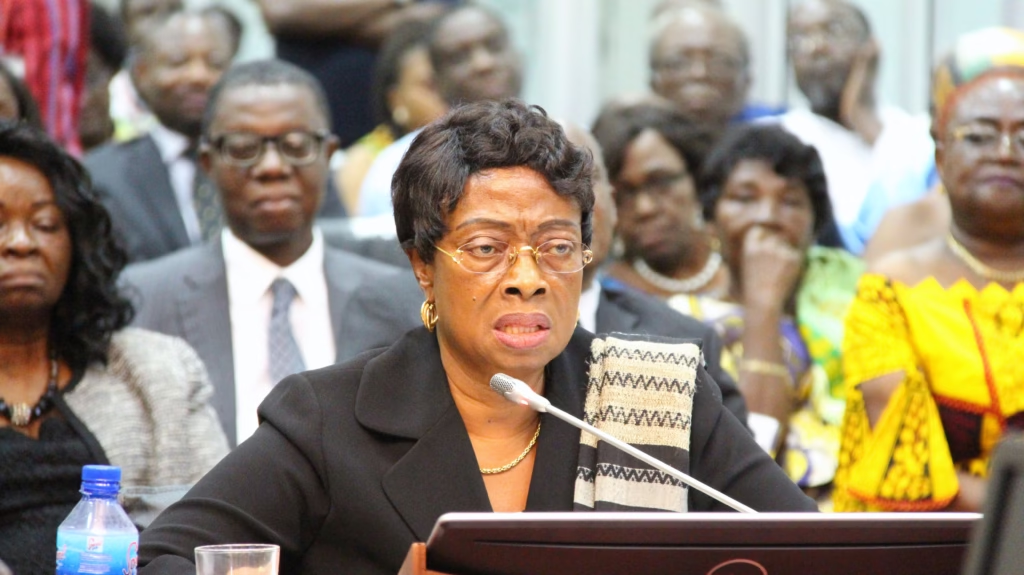Former Chief Justice Sophia Akuffo has called for urgent reforms to Ghana’s 1992 Constitution to ensure that the advice given by the Council of State to the President is binding. Speaking in an interview with Accra-based TV3 on Sunday, February 23, the former Chief Justice expressed concerns about the current arrangement, which allows the President to disregard the Council’s advice without justification.
This article explores her recommendations, the role of the Council of State, and how reforms could enhance accountability and promote good governance in Ghana.
The Role of the Council of State
What is the Council of State?
The Council of State is a constitutional body established under Article 89 of Ghana’s 1992 Constitution. It serves as an advisory body to the President, offering counsel on national matters. Members are selected based on their expertise, experience, and ability to provide insightful guidance on governance issues.
However, the Council’s role is purely advisory, meaning the President is not obligated to act on its recommendations. This has raised concerns about the effectiveness of the Council in ensuring checks and balances within the executive arm of government.
For more on Ghana’s Council of State, visit Government of Ghana: Council of State.
The Need for Constitutional Reforms
Current Limitations
In her interview, Sophia Akuffo highlighted the limitations of the current system, where the President can ignore the Council of State’s advice without providing any justification.
“In its current state, the Council of State’s role remains largely advisory, with no mechanism to compel the President to act on its recommendations,” she explained.
This lack of accountability undermines the Council’s ability to influence governance and ensure transparency.
Lessons from India
Akuffo cited India’s legal framework as a model for reform. In India, while the advice of a similar advisory body is not binding, the President must provide a strong justification for not adhering to it.
“In India, the courts ruled that when such a body gives advice, the President must take it seriously and justify any decision to disregard it,” she said.
This approach ensures that advisory bodies play a more influential role in governance, promoting accountability and good governance.
Proposed Reforms
Making Council of State Advice Binding
Akuffo proposed that Ghana’s Constitution be revised to make the Council of State’s advice binding on the President, or at least require the President to provide a strong justification for not following it.
“It will be more desirable to reform or revise that part of the Constitution relating to the binding effect of the advice given by the Council of State,” she stated.
This reform would enhance the Council’s role in governance and ensure that the President is held accountable for decisions that deviate from its recommendations.
Enhancing Checks and Balances
By making the Council of State’s advice binding, Ghana can strengthen its system of checks and balances. This would prevent the executive branch from acting unilaterally and ensure that decisions are made in the best interest of the nation.
“This is a good way forward in nation-building and assurance of good governance,” Akuffo emphasized.
For insights into checks and balances in governance, visit UNDP: Governance.
The Broader Impact of Reforms
Promoting Accountability
Reforming the Constitution to make the Council of State’s advice binding would promote accountability within the executive branch. It would ensure that the President considers the expertise and experience of Council members before making critical decisions.
Strengthening Democracy
Such reforms would also strengthen Ghana’s democracy by ensuring that governance is more inclusive and transparent. By giving the Council of State a more influential role, Ghana can build a more robust and resilient democratic system.
For more on strengthening democracy, visit Democracy Index.
Call to Action: Advocate for Constitutional Reforms
To support the call for constitutional reforms, here’s what you can do:
- Raise Awareness: Share this article and educate others about the need for reforms.
- Engage with Policymakers: Contact your representatives and urge them to prioritize constitutional reforms.
- Support Good Governance Initiatives: Donate to organizations promoting transparency and accountability in Ghana.
Conclusion
Former Chief Justice Sophia Akuffo’s call for reforms to Ghana’s 1992 Constitution is crucial to enhancing accountability and promoting good governance. By binding the advice of the Council of State, Ghana can strengthen its democratic institutions and ensure that the president is held accountable for critical decisions.



